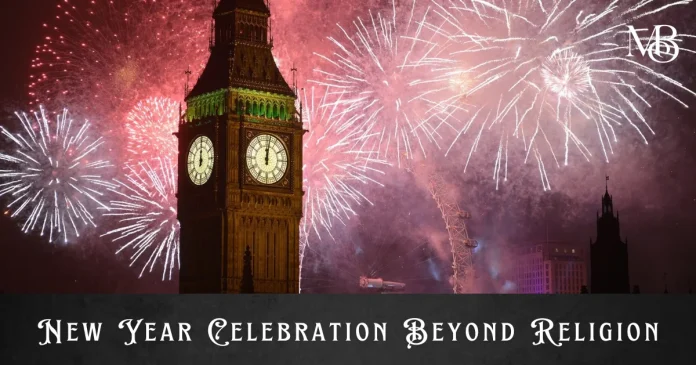New Year Celebration Beyond Religion: New Year’s Day is one of the most widely celebrated events globally, yet it often carries a misconception of being a Christian festival. This belief likely stems from the association of January 1st with the Gregorian calendar, which has roots in Western Europe and the Catholic Church. However, the celebration of a new year transcends religious boundaries and finds its place in nearly every culture, civilization, and belief system across history. This blog explores the origins, diversity, and significance of New Year celebrations around the world, proving that it is a universal observance rather than a religious one.
The Origins of New Year Celebrations
The idea of marking the passage of time and celebrating the start of a new cycle is ancient. Civilizations as early as the Babylonians, over 4,000 years ago, held festivals to honor the arrival of a new year. These celebrations often coincided with agricultural or astronomical events, reflecting the importance of nature and the seasons.
The Babylonians marked their new year in March during the vernal equinox, symbolizing rebirth and planting. Similarly, the ancient Egyptians celebrated the New Year when the Nile flooded, ensuring fertile lands for the coming harvest. This alignment with natural phenomena highlights how early societies used the concept of a new year to express gratitude and hope, independent of religious doctrine.
The Gregorian Calendar and January 1st
In 1582, Pope Gregory XIII introduced the Gregorian calendar, which standardized January 1st as the start of the year. This calendar reform was an attempt to correct the inaccuracies of the Julian calendar and align the annual calendar more accurately with the solar year. While this change originated within the Catholic Church, the adoption of the Gregorian calendar spread globally, driven by trade, colonization, and globalization rather than religious proselytization.
New Year Celebration Beyond Religion
Today, the Gregorian calendar is the most widely used civil calendar, but the celebration of New Year’s Eve and Day is largely secular. Fireworks, parties, and countdowns have little to do with Christianity and instead reflect human joy, renewal, and shared hope for the future.
New Year Celebrations Across Cultures
New Year Celebration Beyond Religion takes on unique forms across different cultures, reflecting the rich tapestry of global traditions. Each festivity, while distinct in its rituals, shares the common thread of renewal, hope, and unity.
1. Chinese New Year
The Chinese New Year, also known as the Lunar New Year or Spring Festival, falls between late January and February, depending on the lunar calendar. This vibrant festival, rooted in ancient Chinese customs, involves family reunions, feasts, dragon dances, and fireworks. It symbolizes renewal, prosperity, and the expulsion of bad luck from the previous year.
2. Nowruz (Persian New Year)
Nowruz, celebrated by millions across Iran, Central Asia, and parts of the Middle East, marks the spring equinox around March 20-21. This 3,000-year-old festival has Zoroastrian origins and is a time for house cleaning, feasts, and the Haft-Seen table, adorned with symbolic items representing growth, wealth, and health.
3. Rosh Hashanah (Jewish New Year)
Rosh Hashanah, observed in September or October, signals the start of the Jewish High Holy Days. It is a solemn occasion marked by prayer, reflection, and the blowing of the shofar (ram’s horn). Unlike secular New Year’s celebrations, Rosh Hashanah emphasizes spiritual renewal and introspection.
4. Hindu New Year
Hinduism, with its vast diversity, recognizes multiple New Year celebrations depending on regional and cultural practices. Ugadi, Gudi Padwa, and Puthandu are a few examples celebrated across India. Diwali, the festival of lights, is also considered a new year by certain communities, symbolizing the triumph of light over darkness and good over evil.
5. Islamic New Year
The Islamic New Year, known as Hijri New Year, marks the beginning of the month of Muharram, the first month of the Islamic lunar calendar. It commemorates the migration (Hijra) of Prophet Muhammad from Mecca to Medina, an event of great significance in Islamic history. Unlike other New Year celebrations, this day is often observed with quiet reflection and prayer.
6. Japanese New Year (Shōgatsu)
Japan celebrates New Year’s Day on January 1st, but its customs blend Shinto and Buddhist traditions. Families clean their homes to welcome the Toshigami (New Year gods) and visit temples or shrines at midnight. The ringing of temple bells 108 times represents the cleansing of worldly desires.
Common Themes Across Cultures
New Year Celebration Beyond Religion, despite their differences, most New Year celebrations share several common themes:
- Renewal and Rebirth: Across cultures, New Year marks a fresh start. Cleaning homes, wearing new clothes, and letting go of past grievances are practices aimed at inviting prosperity and positive energy.
- Family and Community: New Year festivities often emphasize family gatherings, reunions, and communal activities, reinforcing social bonds.
- Symbolism and Rituals: Fireworks, feasts, and symbolic foods (such as lentils, fish, or sweets) reflect wishes for abundance, luck, and longevity.
Why the Misconception?
The misconception that New Year is a Christian festival likely arises from the dominance of the Gregorian calendar and Western cultural influence. However, even within Christian traditions, the religious new year does not align with January 1st. For instance, the liturgical year in many Christian denominations begins with Advent, weeks before Christmas.
New Year Celebration Beyond Religion, the secular nature of modern New Year celebrations often overshadows its historical roots. The focus on parties, fireworks, and resolutions contributes to the perception that it is a universal, non-religious festivity.
Embracing New Year as a Global Tradition
Understanding the diverse ways in which cultures celebrate the new year fosters greater appreciation and respect for global traditions. It highlights humanity’s shared desire for renewal, hope, and joy, transcending religious and cultural differences.
✨ Setting Smarter Resolutions for 2025 – A Guide to Meaningful Growth ✨
New Year’s Day, whether observed on January 1st or during a different season, ultimately reflects the human spirit’s resilience and aspiration for a better future. By recognizing the universality of these celebrations, we can move beyond misconceptions and celebrate the richness of our collective heritage.
If you liked New Year Celebration Beyond Religion so far then you might also like: 10 New Year Celebration Ideas: Ringing in 2025 with Fun and Laughter!
So, as you ring in the next New Year, remember that you are participating in a tradition that unites people from all walks of life, across every continent and faith. It is not a Christian festival, but a celebration of humanity itself. Follow our culture page for more.


